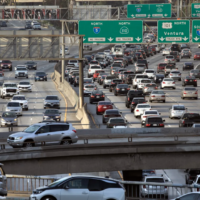Storper on the Pandemic’s Lasting Impact on Cities
Urban Planning Distinguished Professor Michael Storper co-authored a paper assessing COVID-19’s anticipated impact on the economic, political and social fabric of cities for the journal Urban Studies. As the world continues to adapt to the pandemic, “we remain in a period of extended social experimentation, with households, business, the professions and the public sector all in the game,” wrote Storper and co-authors Richard Florida of the University of Toronto and Andrés Rodríguez-Pose of the London School of Economics. Throughout history, major metropolitan areas have proved resilient to epidemics and other crises and catastrophes, they wrote. “Nonetheless, even if large cities are unlikely to lose their prominent role, they will be transformed and changed — in the short term and even well after mass immunity.” The authors predict that “social scarring” based on the continued fear of coronavirus infection will continue to influence residence choice, travel and commute patterns, and the economic viability of certain businesses and social gathering spaces. The future of downtowns hangs in the balance as remote work is normalized and online shopping grows even more common. “Cities might increasingly become cultural and civic places rather than shopping destinations or office hubs,” they wrote. Despite its horrific toll, the pandemic offers a window of opportunity where cities can reset, re-energize and call old practices into question, the authors conclude. “As cities rebuild and recover, … they can pilot efforts to confront the widening chasms between classes and neighborhoods and prepare for the many threats of climate change.”










Leave a Reply
Want to join the discussion?Feel free to contribute!